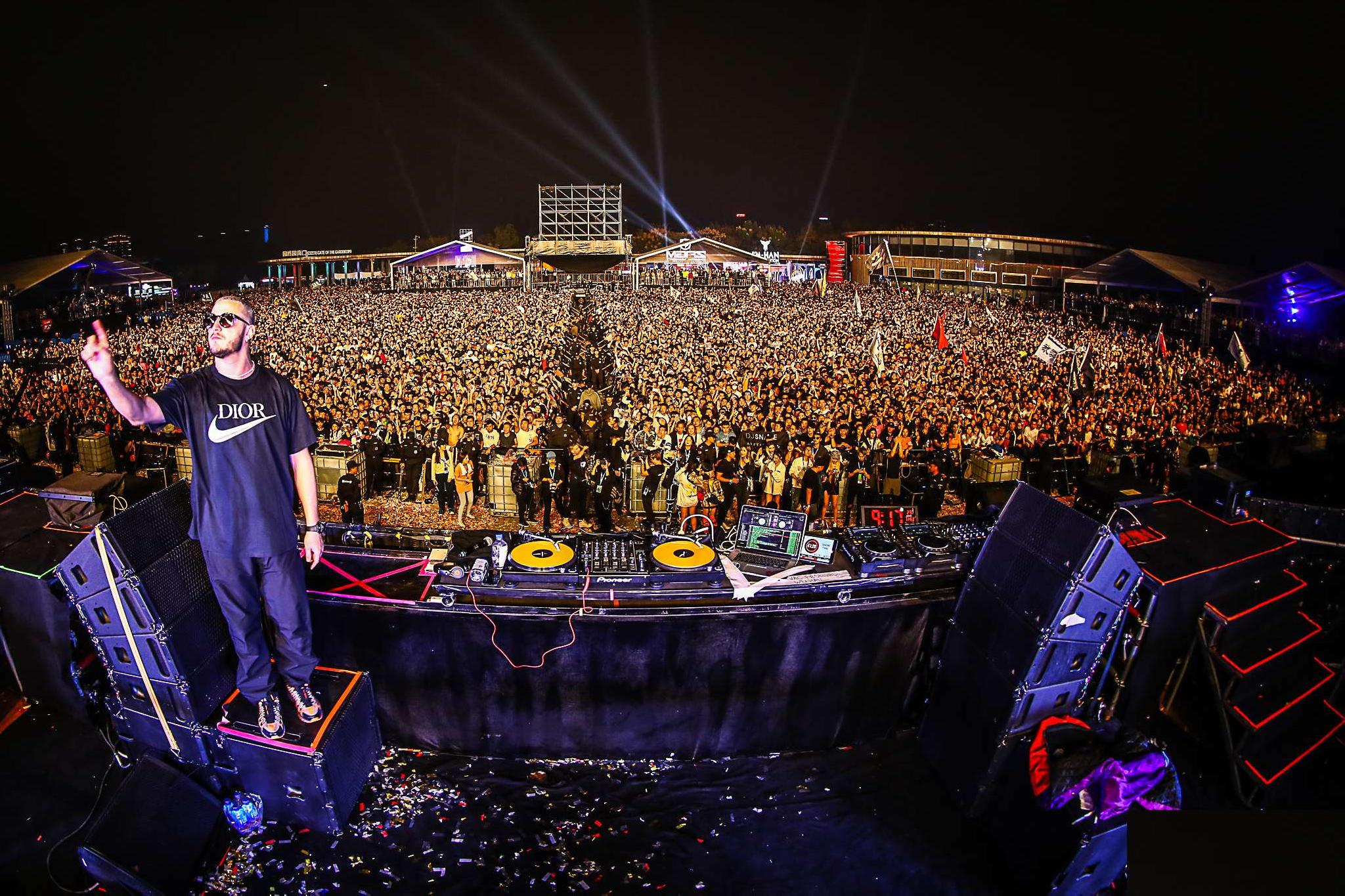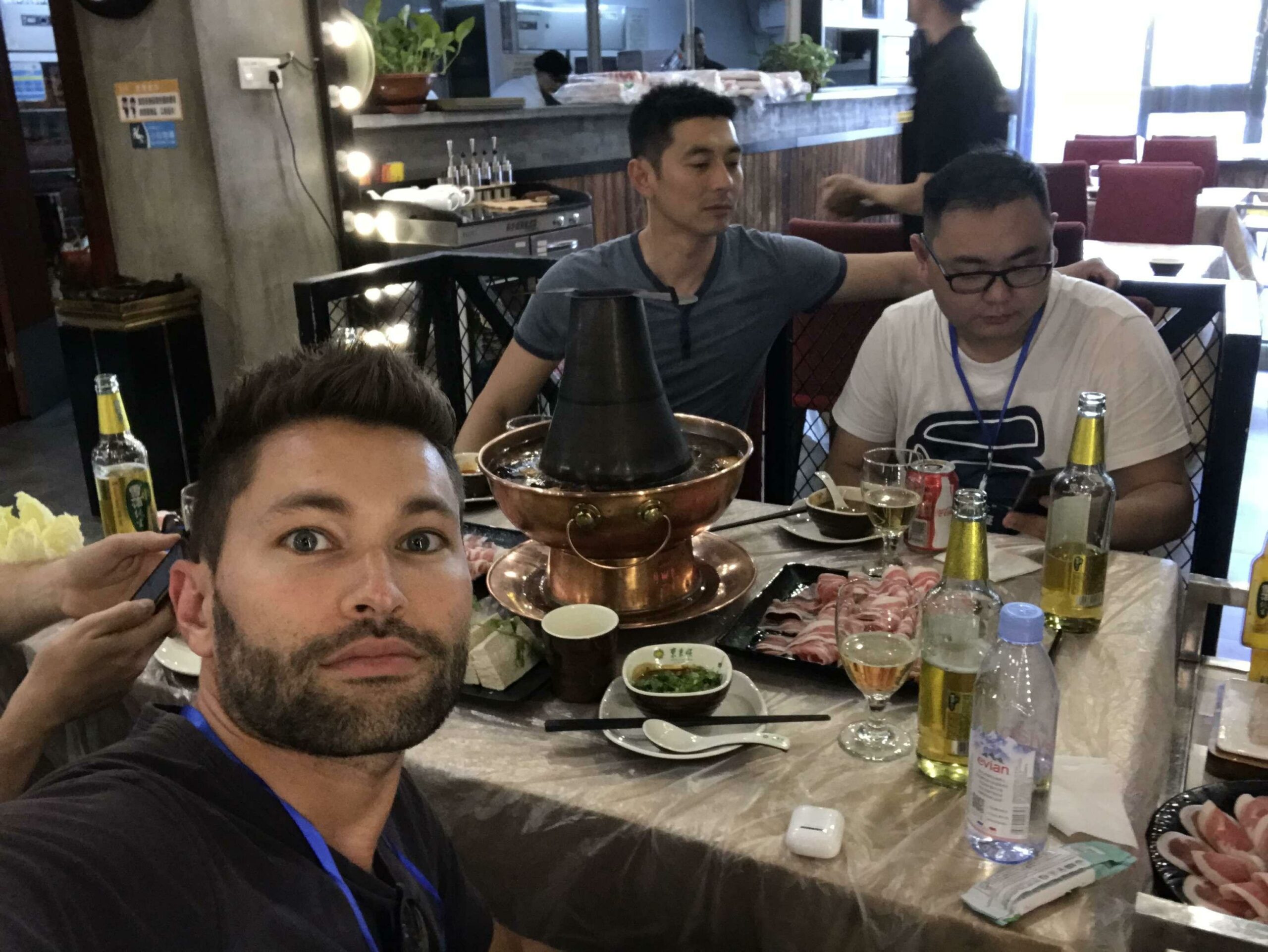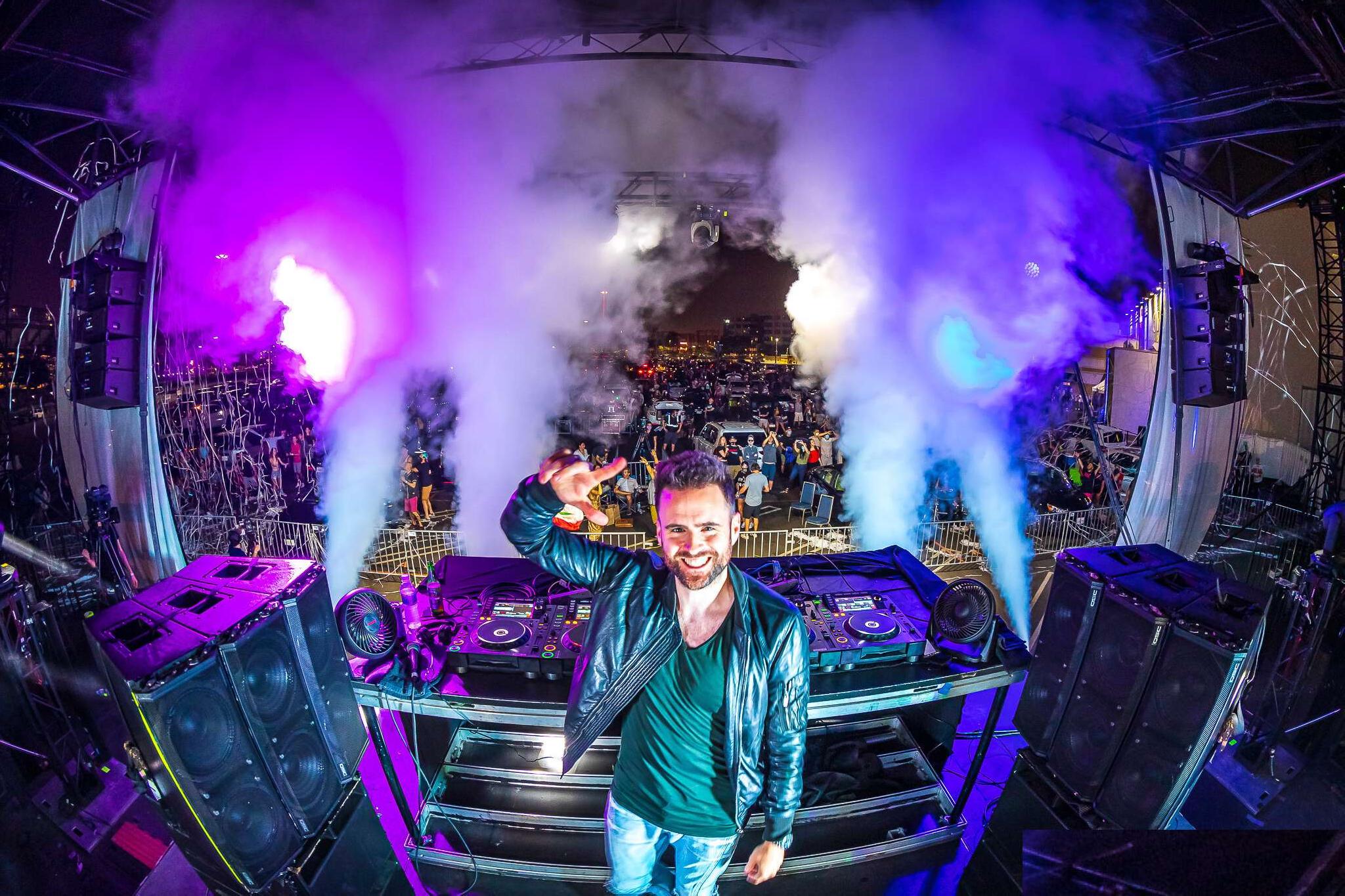Features
From Wuhan to Anaheim: How Jace Cohen Went From EDM Fests In COVID’s Epicenter To Drive-Ins In The O.C.

(Courtesy Versa) – Xiè Xiè Y’all:
DJ Snake post performance at Vision & Colour in November 2019 at Wuhan Garden Expo Park, which brought out 60,000 people over two days.
Jace Cohen of Versa and Nederlander Concerts may have more insight into the live business amidst a global pandemic than anyone out there. This because in the last year he went from throwing the massive Vision & Colour Festival in Wuhan, China, a city of 11 million where the coronavirus first originated, to putting on electronic music drive-in concerts for Nederlander in Anaheim, Calif., during a time of COVID-19 restrictions and still managing to have multiple sellouts for artists like Gareth Emery and Kaskade. Pollstar caught up with Cohen to learn more about the Wuhan market, Anaheim drive-ins and their many similarities.
Pollstar: Give us a quick overview of your career.
Jace Cohen: I started when I was 16 years old as a runner at Electric Factory Concerts in Philadelphia. [Founder] Larry Magid is a relative, he and my mom are first cousins. When I got my drivers license, my mom called Larry, “Hey, will you give Jace a job?” I’m working with Sting and Dave Matthews Band and all these huge acts. I get sent out to buy groceries for their tour buses. I can’t even buy cigarettes or alcohol yet. The Electric Factory turned into Live Nation. I kept that job into college. After college, I worked touring with the Foo Fighters, Keith Urban, the Jonas Brothers and started tour managing a DJ. Live Nation offered me a job as a talent buyer at the Philadelphia office. I started focusing on electronic music exclusively. Philadelphia was a little small for that, so I put in for a transfer to the Live Nation Beverly Hills office where they had just brought in James Barton from [club brand] Cream in the UK to start Electronic Nation. I worked for him for a few years doing tours for The Chainsmokers, Above & Beyond, Kaskade, Deadmau5. James left and Electronic Nation dissolved. I transferred to Insomniac Events as a talent buyer looking after different festivals, cruises, club shows, concerts, all kinds of stuff. About three years ago I started my own company, Versa Entertainment, where we focus on talent buying, creative direction and producing events, anything in the live space.
How did Wuhan get on your radar?
In late 2017, my partner (Toby Benson) and I got a random call from a friend of his from Australia saying she had met some Chinese guys who grew up in Australia and had moved back to China. Their contact reached out and said, “Hey, there’s these guys in Wuhan who are interested in throwing an electronic music festival. Would you be interested in talking to them?” We were like, “Yeah, sure. Can’t hurt. I’ve never heard of Wuhan in my life, but yeah, we’re always happy to have a conversation.” In 2018 they started getting more serious and in April I was at Coachella and left a day early to fly to Wuhan.
What’s Wuhan like?
It’s a massive metropolis type city, similar to Los Angeles. There’s skyscrapers from the moment you leave the airport until you get to the downtown area, which is a 45-minute drive. A lot of universities. There’s a million university students.
So it’s a great music market.
Yes, but there hadn’t been music festivals there. We were one of the first. The city itself is great. It’s very urban. It used to be three cities that combined and it’s all on the Yangtze river. There’s lots of beautiful lakes and countryside but it’s also very urban. I talked to agents, artist managers, DJs and no one had ever heard of it. Is there much infrastructure there for the live business? They have infrastructure. They have tons of parks and different areas where you can create concert venues. They’ve been building more arenas and stadiums. There’s this event called the Strawberry Music Festival, which was a Chinese rock festival, they would just go into a park, set up a stage and have a festival. That was the model we first followed.
What about dealing with government officials?
One of the major things there when you’re putting on an event is working with the government and the police who run everything. If you want to bring in an artist or throw an event, you have to get the approval from the federal government. And it’s structured very well, there’s local governments in every town and you’ve got to have relationships with them. We spent a lot of time with the police, the government, sitting in meetings, doing walk throughs of the venue, having dinner with them. That was something interesting we’re not used to in the Western markets.

(Courtesy Jace Cohen) –
“The Blood Was The Weirdest Thing:” Jace Cohen with colleagues in Wuhan, China where the business dinners are at a whole other level.
What happens at dinners in Wuhan?
The dinners are always a learning experience. There’s always a lot of alcohol and lots of little nuances, rules and customs. We learned as we went, cheering everyone at the table and giving toasts. Even if a lot of the people couldn’t understand us, they appreciated that we stood up and gave a toast, cheered everyone and drank with them. We landed at midnight. I was thinking they were going to take us to the hotel to sleep and get into it the next day; but they took us straight to a restaurant, a hot pot restaurant with like 10 people sitting around a table with a huge pot in the middle with boiling spicy broth. The waiters start bringing different things I didn’t recognize. We start asking what everything is and that’s a mistake. It’s like, “This is cow intestine, this is cow tongue, this is duck feet, this is duck throat, this is duck eyes, this is blood.” The blood was the weirdest thing because it’s congealed blood, they boil it with sugar and it congeals and they slice it. It looked like Jell-O. That was interesting.
How was Vision & Colour’s attendance and ticket sales?
We’ve done three festivals there so far. The market was so starved, they were ready to do a festival almost every six months. We did our first in October 2018. The headliners were Marshmello and Martin Garrix for about 25,000 per day for two days and it sold out. In March 2019 we did our first indoor festival because it’s cold in the winter. It was about 30,000 people.
What were the venues?
The first was in a really big, massive park similar to a Central Park in New York. The one in March was indoors at a convention center. We did about 30,000 for that over the two days. That one broke two records for China: the largest ever indoor electronic music festival and the largest indoor stage ever for any event. It was massive. It was over a football field long. And the third one was November 2019, right? That was the last time we were there and that was our biggest, we did about 30,000 per day. That one also sold out.
How was the production and the teams you worked with?
The production is great. Each time we were blown away by how fast they were able to get these massive stages up and the production. The LED equipment, intelligent lighting systems, a lot of it is built in China so they have access to it at great rates and can get things at the drop of a hat. “Oh, it’s at a factory down the street. We’ll put this up in two seconds.” They have the wildest imaginations when it comes to production. Aside from the lineup, the fans expect to be blown away with incredible production.
How about ticket pricing?
It’s lower there. Our average for a two-day festival was about $200. So maybe closer to half of what a typical U.S. festival would cost. But expenses are less? Yes, expenses are lower. But talent is pretty expensive because you’ve got to get them to China.
Did it feel like a U.S. show?
It could have been Los Angeles or Miami. The vibe from fans is the same as you would find at Ultra in Miami or EDC in Las Vegas. The kids are really excited, super happy, and ready to party. And they have so much energy. They line up early, they’re there at noon before doors open. They rush to the front, stay there the whole time and jump up and down for 10 hours straight.
Were there signs of the Coronavirus in November 2019?
We came in mid-to-late October, about three weeks prior to help with setup and get everything prepped and ready to go and there were no signs of it. Police, government, no one was talking about it. We didn’t start hearing about it until mid-December from our partners in China. We became really close with them, they’re basically family.
What was your reaction?
It was really weird because we were hearing about it from our friends. They were sending us information, like, “Hey, there’s this virus coming. It’s getting pretty bad here. We’re going to lock down.” They locked down Wuhan in either late December or early January, it was just unfathomable. And then it got worse and my friends were like, “We don’t leave the house for anything. Everything is brought to the house. We don’t allow outsiders in.” A few weeks later, it showed up on the shores of the U.S. Everyone started to talk about Wuhan, the city we’d been going to for the past three years that no one had ever heard of. The president talked about it. It was such a bizarre feeling. It felt like our little secret market in China, that we do music festivals at, is now the epicenter of this mega pandemic that’s going to change the course of history. It was tough to deal with.
If you could set the record straight for people about Wuhan, what would you say?
I would say Wuhan is an incredible city with amazing culture, food, people. It’s a city like anywhere else in the world. You could be walking down one of the main shopping streets and feel like you’re on Lincoln Road in Miami or somewhere in New York. It’s a city that has everything. For it to be known as the city people first heard of because of a virus beginning there is unfair to its rich cultural history.

(Courtesy Nederlander) –
Put Your Defrosters On! Gareth Emery, who was Cohen’s first booking at Anaheim’s City National Grove for Nederlander Concerts, did three sold-out nights Sept 18-20, 2020 grossing $190,000, according to Pollstar Boxoffice.
How did you get to Nederlander Concerts?
At Live Nation in Philadelphia I worked with Shane Shuhart, he was one of the head talent buyers. He moved to LA and worked at Nederlander and we always talked about doing stuff together. When the pandemic hit, my business slowed down, their business slowed down, but their drive-in venue at City National Grove in Anaheim popped up. I reached out to Shane and we started talking about bringing in electronic shows. I went to my network of agents, artists and managers to see who was available and found some great DJs who were interested. I worked with the Nederlander folks to come up with great concepts and artwork for the music drive-in events.
What was the first thing you did with them?
We had huge success off the bat. Our first was Gareth Emery; we ended up doing three sold out nights. Our second was Kaskade; we did six sold out shows in Anaheim and then another three sold out in San Francisco. We just had another three sell out last weekend with Deorro. We’re batting a thousand right now.
What’s your job at Nederlander?
I still have my business, Versa Entertainment, and am more of their electronic music consultant bringing in shows that we feed to our different venues. Now we’re doing Anaheim, we’re starting to do more in San Fran and the Bay Area. Early next year we’re going to start rolling into more markets as live entertainment probably isn’t coming back until the second half of 2021.
How does electronic music do at the drive-in?
From a fan’s perspective, pretty great. We run surveys after every show. We’ve been getting great reviews back and customer service reviews that have all been really positive. The experience itself is great, because we bring in extra production for these concerts and a level of staging that people are used to from an electronic music festival.